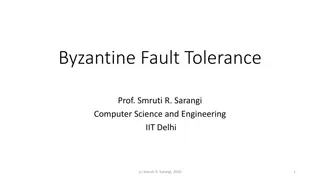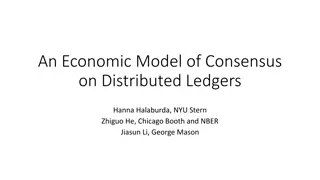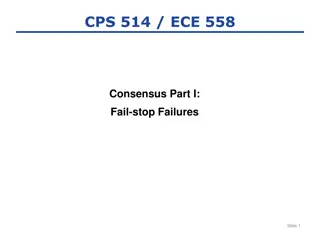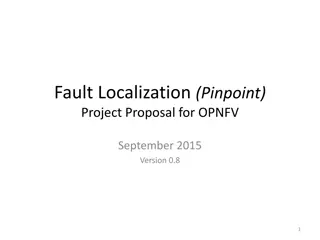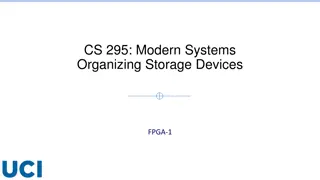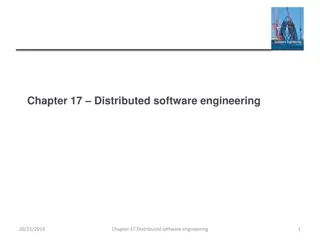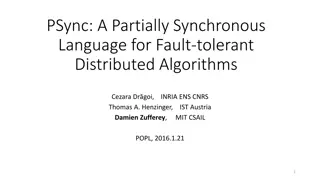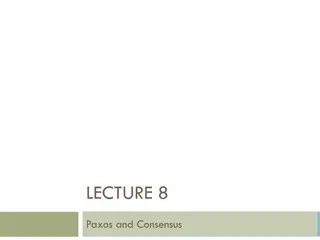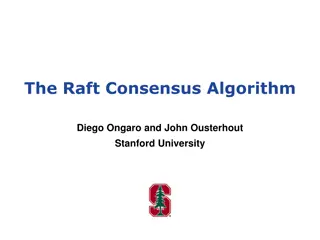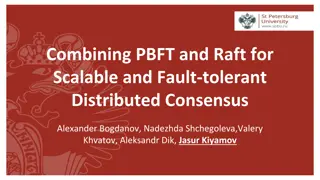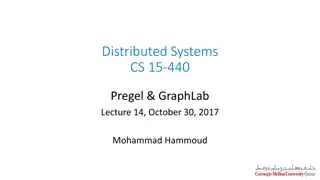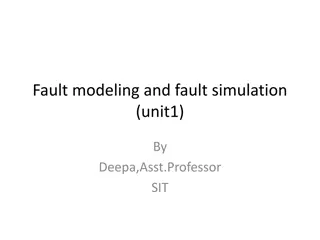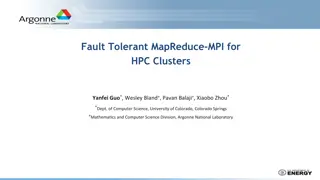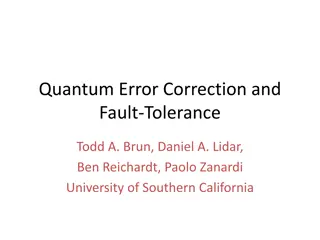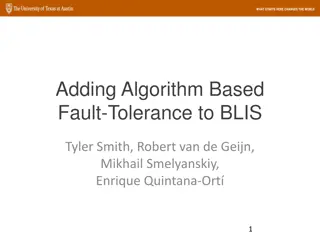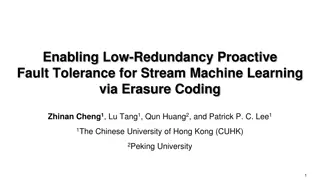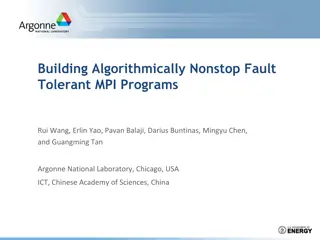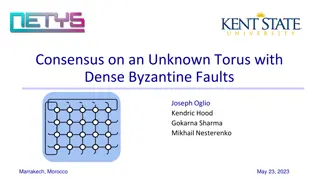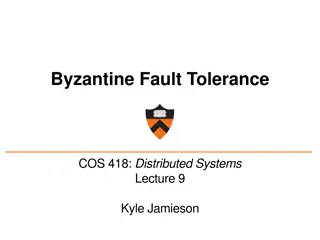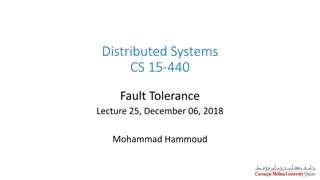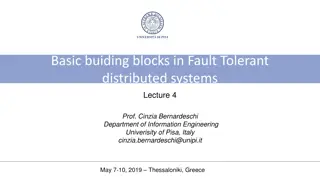Overview of Distributed Systems: Characteristics, Classification, Computation, Communication, and Fault Models
Characterizing Distributed Systems: Multiple autonomous computers with CPUs, memory, storage, and I/O paths, interconnected geographically, shared state, global invariants. Classifying Distributed Systems: Based on synchrony, communication medium, fault models like crash and Byzantine failures. Comp
19 views • 126 slides
Power System Fault Calculation and Protection Analysis
In this technical document, we delve into the calculation of fault current and fault apparent power in symmetrical three-phase short circuit scenarios within power systems. Through detailed equivalent circuit diagrams, reactance calculations, and per unit value derivations, the fault current and app
22 views • 15 slides
Byzantine Fault Tolerance in Distributed Systems
Byzantine fault tolerance is crucial in ensuring the reliability of distributed systems, especially in the presence of malicious nodes. This concept deals with normal faults, crash faults, and the challenging Byzantine faults, where nodes can exhibit deceptive behaviors. The Byzantine Generals Probl
2 views • 29 slides
MapReduce in Distributed Systems
MapReduce is a powerful paradigm that enables distributed processing of large datasets by dividing the workload among multiple machines. It tackles challenges such as scaling, fault tolerance, and parallel processing efficiently. Through a series of operations involving mappers and reducers, MapRedu
8 views • 32 slides
Economic Models of Consensus on Distributed Ledgers in Blockchain Technology
This study delves into Byzantine Fault Tolerance (BFT) protocols in the realm of distributed ledgers, exploring the complexities of achieving consensus in trusted adversarial environments. The research examines the classic problem in computer science where distributed nodes communicate to reach agre
2 views • 34 slides
Distributed Consensus Models in Blockchain Networks
Economic and technical aspects of Byzantine Fault Tolerance (BFT) protocols for achieving consensus in distributed ledger systems are explored. The discussion delves into the challenges of maintaining trust in adversarial environments and the strategies employed by non-Byzantine nodes to mitigate un
0 views • 34 slides
Raft Consensus Algorithm Overview
Raft is a consensus algorithm designed for fault-tolerant replication of logs in distributed systems. It ensures that multiple servers maintain identical states for fault tolerance in various services like file systems, databases, and key-value stores. Raft employs a leader-based approach where one
3 views • 34 slides
Fault Localization (Pinpoint) Project Proposal Overview
The Fault Localization (Pinpoint) project proposal aims to pinpoint the exact source of failures within a cloud NFV networking environment by utilizing a set of algorithms and APIs. The proposal includes an overview of the fault localization process, an example scenario highlighting the need for fau
0 views • 12 slides
RAID 5 Technology: Fault Tolerance and Degraded Mode
RAID 5 is a popular technology for managing multiple storage devices within a single array, providing fault tolerance through data striping and parity blocks. This article discusses the principles of fault tolerance in RAID 5, the calculation of parity blocks, handling degraded mode in case of disk
3 views • 12 slides
Distributed Software Engineering Overview
Distributed software engineering plays a crucial role in modern enterprise computing systems where large computer-based systems are distributed over multiple computers for improved performance, fault tolerance, and scalability. This involves resource sharing, openness, concurrency, and fault toleran
2 views • 66 slides
PSync: A Partially Synchronous Language for Fault-tolerant Distributed Algorithms
PSync is a language designed by Cezara Drăgoi, Thomas A. Henzinger, and Damien Zufferey to simplify the implementation and reasoning of fault-tolerant distributed algorithms. It introduces a DSL with key elements like communication-closed rounds, an adversary environment model, and efficient runtim
15 views • 22 slides
Paxos and Consensus in Distributed Systems
This lecture covers the concept of Paxos and achieving consensus in distributed systems. It discusses the availability of P/B-based RSM, RSM via consensus, the context for today's lecture, and desirable properties of solutions. The analogy of the US Senate passing laws is used to explain the need fo
3 views • 46 slides
The Raft Consensus Algorithm: Simplifying Distributed Consensus
Consensus in distributed systems involves getting multiple servers to agree on a state. The Raft Consensus Algorithm, designed by Diego Ongaro and John Ousterhout from Stanford University, aims to make achieving consensus easier compared to other algorithms like Paxos. Raft utilizes a leader-based a
2 views • 26 slides
Enhancing Distributed Consensus: Combining PBFT and Raft for Improved Security
Addressing challenges in distributed systems, this study proposes a novel approach by combining PBFT and Raft consensus mechanisms to enhance scalability and fault tolerance. The research highlights the importance of secure data storage and identifies new attack mechanisms in today's digital landsca
13 views • 11 slides
Introduction to Google's Pregel Distributed Analytics Framework
Google's Pregel is a large-scale graph-parallel distributed analytics framework designed for graph processing tasks. It offers high scalability, fault tolerance, and flexibility in expressing graph algorithms. Inspired by the Bulk Synchronous Parallel (BSP) model, Pregel operates in super-steps, ena
4 views • 38 slides
Comprehensive Overview of Fault Modeling and Fault Simulation in VLSI
Explore the intricacies of fault modeling and fault simulation in VLSI design, covering topics such as testing philosophy, role of testing in VLSI, technology trends affecting testing, fault types, fault equivalence, dominance, collapsing, and simulation methods. Understand the importance of testing
7 views • 59 slides
Fault-Tolerant MapReduce-MPI for HPC Clusters: Enhancing Fault Tolerance in High-Performance Computing
This research discusses the design and implementation of FT-MRMPI for HPC clusters, focusing on fault tolerance and reliability in MapReduce applications. It addresses challenges, presents the fault tolerance model, and highlights the differences in fault tolerance between MapReduce and MPI. The stu
6 views • 25 slides
Quantum Error Correction and Fault Tolerance Overview
Quantum error correction and fault tolerance are essential for realizing quantum computers due to the challenge of decoherence. Various approaches, including concatenated quantum error correcting codes and topological codes like the surface code, are being studied for fault-tolerant quantum computin
3 views • 19 slides
Enhancing Fault Tolerance in BLIS with Algorithm-Based Techniques
Addressing the challenge of soft errors in supercomputers, this paper introduces algorithm-based fault tolerance methods to enhance the resilience of systems like BLIS. By integrating Application-Based Fault Tolerance (ABFT) into BLIS, the study aims to improve error detection and correction mechani
2 views • 48 slides
Low-Redundancy Proactive Fault Tolerance for Stream Machine Learning
This study focuses on enabling fault tolerance for stream machine learning through erasure coding. Fault tolerance is crucial in distributed environments due to worker failures, and existing approaches like reactive fault tolerance and proactive replication have drawbacks. The use of erasure coding
3 views • 20 slides
Building Algorithmically Nonstop Fault Tolerant MPI Programs
Fault tolerance in large-scale supercomputers is a critical issue due to system failures. This article discusses hardware and software resilience techniques as well as Algorithm-based Fault Tolerance (ABFT) for building fault-tolerant MPI programs.
2 views • 26 slides
Consensus and Fault Tolerance on an Unknown Torus with Dense Byzantine Faults
This content discusses achieving consensus and fault tolerance on an unknown torus with dense Byzantine faults, exploring scenarios of sparse and dense faults in a network setting. It delves into the challenges of consensus algorithms on toroidal networks, highlighting the limits and complexities th
12 views • 23 slides
An Overview of Byzantine Fault Tolerant Consensus
In this overview, explore the fundamental problem of consensus in distributed computing, covering safety, liveness, fault types, research advancements over 40 years, well-known results, and the Sync HotStuff protocol. Delve into the complexities and models of achieving fault-tolerant consensus in va
0 views • 22 slides
An Overview of Byzantine Fault Tolerant Consensus
In this overview, delve into the fundamental problem of consensus in distributed computing, exploring safety and liveness aspects. Discover the various facets of consensus, key research findings, and well-known results in fault tolerance. Uncover insights into Sync HotStuff protocol and its practica
2 views • 27 slides
Distributed System Architectures: Software for Multiple Processors
Distributed system architectures involve designing software to run on multiple processors, optimizing resource sharing, openness, concurrency, scalability, fault tolerance, and transparency. These systems are crucial in today's world where most computer-based systems are distributed. Various types o
1 views • 61 slides
Byzantine Fault Tolerance in Distributed Systems Lecture
Explore Byzantine fault tolerance, state machine replication, and practical algorithms like Paxos and Raft in distributed systems. Learn about handling arbitrary failures, providing high reliability, and case studies on fault-tolerant systems like Boeing 777 fly-by-wire controls.
4 views • 41 slides
Fault Tolerance in Distributed Systems
Explore fault tolerance in distributed systems, covering topics such as detecting errors, containing errors, masking failures, and reasoning about fault tolerance. Learn about safety and liveness properties essential for reliable system design.
4 views • 44 slides
Fault Tolerance in Distributed Systems: Overview and Strategies
Explore fault tolerance in distributed systems, covering topics like Byzantine failures, high availability, and handling system faults. Learn about the importance, challenges, and advantages of fault tolerance for ensuring reliable and secure operations in distributed computing environments.
3 views • 33 slides
Fault Tolerance and Failure Characteristics in Distributed Systems
Learn about fault tolerance in distributed systems, detecting and masking failures, and the characteristics of transient and persistent failures. Explore how failures can impact system behavior and operations, and discover the importance of designing systems with fault tolerance in mind.
1 views • 32 slides
Fault Tolerant Consensus for Reliable Systems
Explore the concept of fault-tolerant consensus in computer systems, covering topics such as Byzantine fault tolerance, replication strategies, consensus types, and fault tolerance bounds. Learn about key protocols like PBFT and motivations behind fault tolerance in system design.
5 views • 20 slides
Intro to Distributed Systems & Challenges
In this content, you will explore the fundamentals of distributed systems, including their definition, history, and key challenges like scalability, fault tolerance, reliability, security, and privacy. Learn about the evolution and early examples of distributed systems and understand their significa
0 views • 23 slides
Redundancy in Fault Tolerant Computing Lecture by Prof. Cinzia Bernardeschi
This content covers the importance of fault tolerant computing in safety-critical systems, such as transport and medicine. It discusses forms of redundancy like hardware, information, timing, and software redundancy. The lecture outlines why fault tolerance is crucial for computer-based systems and
0 views • 72 slides
Fault Tolerant Distributed Systems: Models and Solutions
Explore fault models in distributed systems, understanding communication failures, node failures, and Byzantine processes. Learn about fault tolerance algorithms and the impact of fault models on system complexity. Discover key concepts presented in a lecture by Prof. Cinzia Bernardeschi.
2 views • 65 slides
Fault Tolerant Distributed Systems Overview
This lecture by Prof. Cinzia Bernardeschi explores fault models in distributed systems, emphasizing the design of fault-tolerant systems to handle various types of failures such as node and communication failures. It covers concepts like Byzantine failures, crash failures, building blocks for fault-
0 views • 58 slides
Fault Tolerant Distributed Systems Building Blocks
Explore fault models in distributed systems, discussing communication failures, Byzantine processes, and algorithm construction for fault tolerance. Learn about atomic actions, consensus problems, and more in this comprehensive lecture.
3 views • 65 slides
IS.651: Distributed Systems Consensus Challenges
Distributed systems present challenges such as consistency, concurrency, machine failures, network failures, and replication. Various replication models like Primary-Backup and Viewstamp Replication play crucial roles in ensuring system correctness and fault tolerance. The concept of consensus is di
2 views • 50 slides
Discretized Streams: Fault-Tolerant Streaming Computation
Many important applications require processing large data streams in real time with second-scale latency, scalability to hundreds of nodes, and fault tolerance. Discretized Streams offers a solution by treating streaming computation as a series of small batch jobs stored in memory as Spark RDDs. RDD
0 views • 17 slides
Understanding Fault Tolerance in Distributed Systems
Explore fault tolerance mechanisms in distributed systems, covering fault classification, tolerance types, core problems, consensus results, and algorithms. Learn about fault types, masking systems, agreement protocols, clock synchronization, and more to enhance system reliability and resilience.
1 views • 19 slides
Understanding Distributed Systems in Computer Science
Learn about distributed systems, including key concepts, challenges, and benefits. Explore topics such as reliability, fault tolerance, and communication in distributed computing. Discover why distributed systems are essential for modern computing and how they enable more powerful, scalable, and fau
4 views • 136 slides
Understanding Universality and Consensus in Distributed Systems
Explore the concepts of universality and consensus in distributed systems, including deterministic objects, Herlihy's consensus hierarchy, 2-consensus objects, and (n,k)-set-consensus. Delve into the implications of these ideas on system scalability and implementation in various processes.
1 views • 143 slides


